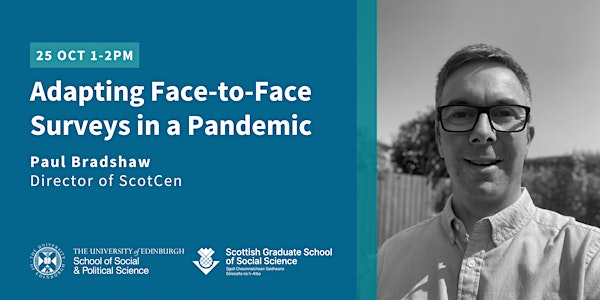
Registrations are closed
We are no longer taking bookings for this seminar. Please visit the RTC website (research-training-centre.sps.ed.ac.uk) to find out more about future seminars and events.
Adapting face-to-face surveys in a pandemic
Learn how ScotCen adapted large-scale face-to-face surveys during the pandemic and the implications for future survey design.
Date and time
Location
G.07 Meadows Lecture Theatre - Doorway 4, Medical School, The University of Edinburgh
Teviot Place Edinburgh EH8 9AG United KingdomAbout this event
This event is open to staff and students at the University of Edinburgh. If you are external to the University, you can participate online by registering for the live-stream: https://adapting-face-to-face-surveys-online.eventbrite.co.uk
This seminar forms part of the Research Training Centre's Talking Methods seminar series delivered in association with the Scottish Graduate School of Social Science.
Abstract
The many large scale face-to-face, random probability social surveys which routinely run in Scotland – the Scottish Health Survey, the Scottish Crime and Justice Survey, the Scottish Household Survey, Growing Up in Scotland and Scottish Social Attitudes – rely on face-to-face data collection. Samples are generally drawn from Postcode Address Files and households are visited by survey interviewers. When lockdown was introduced in March 2020, these surveys – and many like them across the rest of the UK and the world - had to pause data collection. As restrictions continued, research teams sought to adapt survey designs to allow fieldwork to restart. The adapted designs – using a mixture of interviews and questionnaires via web, telephone, video and paper – affected response rates, representativeness and limited the data which was collected in some cases, but they also facilitated large-scale tests of new techniques and practices which have significant implications for the future of survey data collection. This presentation will draw on the experience of ScotCen over the last two years, describing the changes made to several Scottish surveys during that time and discussing the implications of these changes for future survey designs.
Biography
Paul Bradshaw is Director of ScotCen Social Research, an independent, not-for-profit research institute and part of NatCen Social Research. In a career spanning 20 years, Paul has worked on a wide range of studies across many policy areas, though his primary focus has been research on children and families. Most notable is his role on the Growing Up in Scotland study, a large-scale multi-cohort, multidisciplinary prospective longitudinal study which Paul has led since its launch in 2005. Paul is a fellow of the Academy of Social Sciences and a nationally leading researcher in longitudinal surveys with a track record in developing methodologically challenging studies.
Event Schedule
13:00 - 13:10 - Introductions
13:10 - 13:40 - Talk
13:40 - 14:00 - Q&A
14:00 - 15:00 - Refreshments (optional)